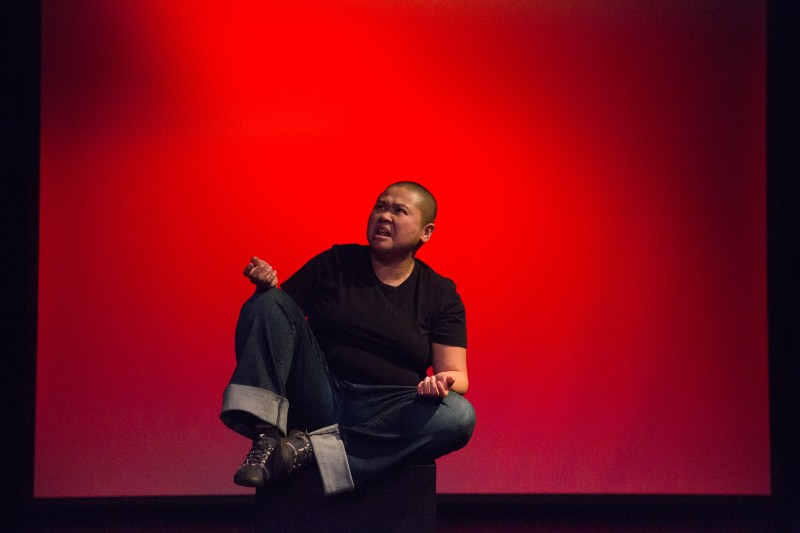With a white majority demographic of 46.3% as of the start of this school year, Stanford University can only be described as an apt setting for second-year Ph.D. student Thao Nguyen’s masterful solo piece “White Power: A Comedy.” Part of the department of Theater & Performance Studies’ annual Grad Student Repertory Theatre, “White Power: A Comedy” is an exploration into the issues of cultural appropriation, structural racism and the general, well, basicness white people get up to when exposed to a culture that doesn’t belong to us.
Inventively integrating video projections and short films throughout the piece, the show begins on an ostensibly light-hearted note – with a skit about a group of children arguing over superpowers. Starring Nguyen in every role, the video follows the group as one of the children, rather than come up with her own idea for a superpower, steals the ideas of her playmates. When told to think of something more original, the child responds: “I did. I’ve got White Power.”
With that, we are plunged into the world of Thao’s childhood, where we are shown a series of anecdotes about the experience of a young, Vietnamese, Buddhist kid at a predominantly white, Catholic, American school. With an impressive command of physical comedy, verbal impressions, and expert timing, Nguyen captures the essence of the many conflicting voices in her life – from Cathy the Catholic (who, in the schoolyard, informs Thao of her imminent descent into Hell) to her father (who, in a heart-melting monologue, advises Thao to push back against an unkind world), to an aggressively cheery sex-shop statue of the monk Budai (who, as Thao points out, is obnoxiously mistaken for the Buddha by unenlightened customers). Bold lighting changes take us from one skit to the next as we are offered insight into different periods in Thao’s life, all presented with minimal set and costume pieces.
Seamlessly transitioning from hysterical conversations to moments of poignant sincerity, Nguyen introduces us to a paradigm of the “immigrant narrative” which isn’t one-sided in its tragedy or tendency to, like the Buddha himself, be re-processed into kitsch. She recounts, with incredible patience, the stories that so many of us often refuse to hear – of Buddhist temples in America being first petitioned against, then shot at, and finally invaded by swarms of white people showing off their organic hemp pillows and tossing around misplaced “Namastes.” Thao characterizes the entrance of white culture into her psyche as if it is a virus, here to delete the “Buddha.jpeg” file that has played such a significant part in her cultural, social, and religious programming. As she grapples with white men who are determined to call her “Dao” (or, in an unfortunate twist, use their familiarity with her name to feed their own sense of self-importance), she is confronted with the even larger task of recovering that file, and restoring to herself a version of the Buddha not corrupted by Western narratives. “I can’t walk around with this much spit and venom and call myself a Buddhist,” she tells herself as she struggles to reconcile her anger with the lessons of her childhood.
Thus, “White Power: A Comedy” is not merely an examination of Nguyen’s real-life experiences with whiteness – it is also an attempt to grapple with her own background on her own turf, to define what her faith and heritage mean to her without the discriminatory and condescending feedback of white America. Indeed, many of the anecdotes in the show are also about the beauty and resilience present in Thao’s experience. Though whiteness has greatly complicated her relationship to the country in which her family now lives, she refuses to be defined by her oppression, and allows us to see, through a child’s eyes, the moments of magic which life has granted her. As she learns to meditate with her grandmother, we see a young Thao transition from the restlessness of childhood boredom to the stillness that comes with inner peace. As she attempts to order cafeteria food in a language foreign to her tongue, we see her befriend one of the servers, who teaches her to say the word “pizza” and offers her her own carton of chocolate milk. As she struggles to respond in her classes with anything other than “I don’t know,” we see her hand-in-hand with her mother, who explains to her teacher that Thao is not being disrespectful, but asking for help – that perhaps it is not Thao, but her teacher who really doesn’t know what’s going on.
At times heartbreaking and at times grotesquely funny, “White Power: A Comedy” tells a story familiar to many who are made to exist on the outskirts of a culture ostensibly built for inclusion. Throughout Nguyen’s performance, the crowd was alive with uproarious laughter, murmurs of recognition, empathetic mumbling and gasps of astonishment. For some, the piece seemed to hit home, echoing versions of an experience which continues to reverberate around the country. For others – namely, those of us in the crowd with white skin – it struck directly at the places we call home, raising a number of important questions about the way we treat others and the privilege we so often weaponize against people of color.
Contact Madelaine Bixler at mbixler ‘at’ stanford.edu.
